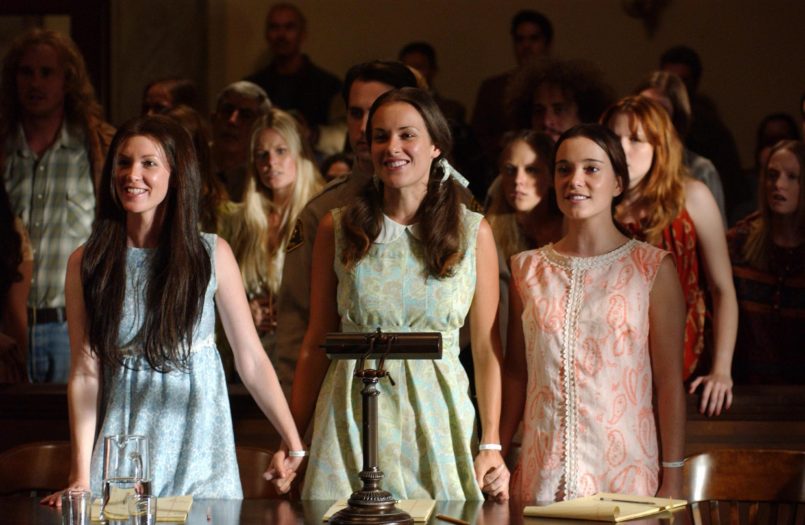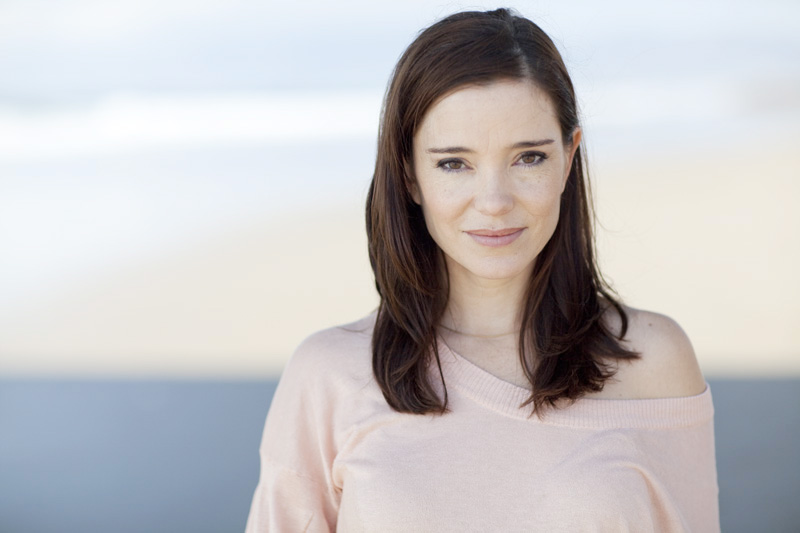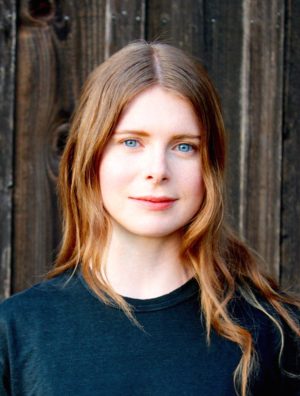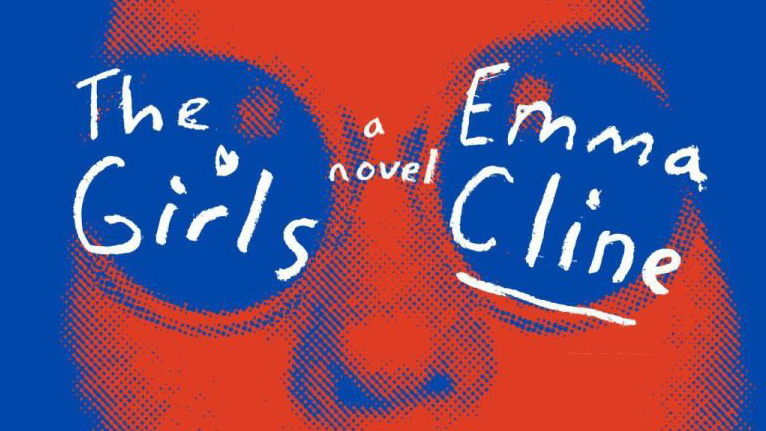Emma Cline’s The Girls was always going to be an odd kind of summer phenomenon. The quietly sinister novel, which was published this June to outstanding reviews, may have changed the names of Manson Family members and transplanted their story up to Marin County, but it still tells the familiar story—with one telling exception: rather than focus on the group’s leader (“Russell,” in this version of things), Cline follows Evie Boyd, an unformed young woman who is seduced by the group’s eerie charisma but who now, years later, struggles to reconcile herself with her past complicity—however small her role.
The book arrived on the scene like a blockbuster—celebrity endorsements and all—and it sold like one, too, but in the end it’s a quiet book that asks more questions than it answers. It is, in other words, the perfect book club book. And who better to join us in this first FLOOD Book Club than Marguerite Moreau. In addition to a number of other roles (including Katie in Wet Hot American Summer), Marguerite played Susan Atkins in the 2004 TV adaptation of Vincent Bugliosi’s Helter Skelter. In The Girls, the Susan Atkins character has morphed into “Suzanne,” the object of Evie’s greatest affections, and although she is granted more depth and personality than Susan Atkins is in Helter Skelter, the identity is still very clear. Suzanne is Susan.
Marguerite and I chatted about The Girls, adolescence, the weird relevance of the 1960s, ISIS, and of course, book clubs. I’m not sure we ever got to the bottom of the Manson phenomenon, but it was nice to talk with someone who, like Emma Cline, seems eager to go beneath the surface.

Moreau, right, as Susan Atkins in Helter Skelter
How familiar were you with the Manson Family story prior to your work on the series, and what did you have to do by way of research?
Honestly, I was in my early twenties then, and my research for that show introduced me to that whole time period. I went as deep as I could: I read Helter Skelter, I was talking to Vincent Bugliosi whenever he was available, I read Susan Atkins’ book—which she wrote in prison, I believe—and I also went to CineFile in LA for obscure videos on the subject. I rented every single thing I could find.
You’ve spent most of your career playing fictional characters, but Susan Atkins is as real as the murders themselves. Did that fact change how you prepared for the role?
I’m always trying to find areas where my characters and I overlap. You don’t want to judge your character; you want to find out why she’s doing the things that she’s doing. A lot was changing in the late 1960s—the dynamics of the nuclear family, sexual mores, women’s rights, civil rights. There was a lot of pushing back against the old norms, and almost all of it was for the better. And I shared in the benefits of all that. So for me, it was trying to see where she was coming from, and trying to understand what she was still lacking and what it must have felt like for a very neglected young woman to have this guy come in and just sweep her off her feet. She was just looking for something to make her feel like a woman and revitalize her.
I think these themes are also in the book, too: being seen (or not seen) and being on the precipice of life, the way a fourteen-year-old feels. Girls especially. You’re ripe for the picking if the right someone comes along. You want to be part of something bigger, you want to stand for things, and when you want to live a principled life, dogma’s pretty hard to resist.

Marguerite Moreau
Suzanne was clearly modeled on Susan Atkins, but did you find that the Suzanne character matched up to the character that you played—or did Cline’s character surprise you?
I wish Emma Cline’s novel had been around when I was playing Susan. The relationships that Suzanne has to the other women in Cline’s cult is much more specific than it was in what I had read before, and there was a clearer understanding of the hierarchies that would have been at play. In the world of the miniseries, the focus is on Manson and the girls are all more or less equal, whereas in The Girls, you get the sense of her really being one of the leaders, and you also get a chance to see how age also becomes a deciding factor in terms of power.
That hierarchy issue is really interesting. It actually brings to mind something that I had trouble navigating in the book—namely, the extent to which the question of “girlhood” even matters. How did you respond to the way the book portrays girlhood?
“You want to be part of something bigger, you want to stand for things, and when you want to live a principled life, dogma’s pretty hard to resist.”
I think Cline did a fantastic job of capturing the mind of a fourteen-year-old girl. That’s probably where the book is most successful. That’s our narrator, that’s our entrance into this world. And it’s really focused on that pivot point between childhood and adulthood, and the fact that Evie is, if anything, overeager to cross that bridge.
What did you make of Cline’s decision to shift the narrative perspective between adolescence and adulthood? At the very least, it seems to imply that the boundary line between those two states is not as firm as we like to think.
Yeah—how heartbreaking when you realize that Evie hasn’t improved upon herself [in adulthood]. She may not have had the best parents, but after her period of rebellion and her time [with the cult] she’s still supported—she even gets to go to boarding school! And despite that, in her adult life, you have a character who is still kind of a drifter, who’s moving in and out of other people’s lives. It was as though that became the rule for her rather than a moment in her life that motivated her to work for something else.
That’s one of several dichotomies that’s present in this book that aren’t necessarily front and center in the Manson story as we tend to think of it. Are there any other elements here, whether in terms of themes or characters, that you felt were absent from Helter Skelter or other previous representations?
Oh, definitely. Cline writes so beautifully. Whether you think the book as a whole is a successful or not, I don’t think there’s any denying the quality of her prose. She isn’t reporting the facts of the case; she’s taking you into the energy of this experience. On the drive to [the victim’s] house. Into the execution of these horrible murders. Giving you the point of view of the victims. All of that just put in my body a kind of energy that made me have to put the book down. I definitely don’t remember responding to the horrific nature of the crimes in the same way when I [read Helter Skelter].

Emma Cline / photo by Megan Cline
Cline takes a dark, historic event, and she expands upon it without exploiting it. I never got that sense of being back in that time from anything else: of understanding why people stopped picking up hitchhikers—which I did not understand when we made the movie—or why people locked their doors at night and became much more suspicious of strangers, or why the ’60s and the sexual revolution were suddenly just over.
So it sounds like you really liked this book and were affected by it, despite some qualms. Is that fair to say?
I would say that I very much enjoyed the book given the topic and the internal exploration of coming of age, but overall I don’t know if it’s the most successful book. We read this in a [different] book club that I’m in, and a lot of us couldn’t help comparing it to Elena Ferrante, another author who’s pretty interested in the topic of girls. Cline writes a book that’s much shorter and cleaner versus the messy, in-depth, drawn-out—even epic—world of the girls in Ferrante’s Italy.
The Girls is focused on someone who is, and remains, a simple suburban American girl, while Ferrante focuses on girls living in a more complex world where they have access to so many other things. Cline’s writing mirrors the world that Evie comes from, that limited experience of adults and cities, but I think I just prefer the more epic, sprawling journey that Ferrante offers.
I was a late arriver to the book club scene, but I’m really into it now. Drinks and distractions aside, I love that they force us to think about what we read just a little more deeply. That’s an obvious point, I guess, but I continue to be surprised by what a difference it makes, and how often book clubs change my perceptions of a book. Did anything change for you when you discussed The Girls?
We had such a great talk about this book. We wound up wondering what the subculture is now—is there even a subculture?—and about cults, of course. So it made us think about ISIS, where people are looking to participate, where people are looking for something to call their own, and it made ISIS seem much more relevant to the American experience as a whole.
“The Girls feels especially relevant given our current situation, in terms of thinking about what people are searching for and how people become indoctrinated. But now everything’s magnified. It’s not a subculture anymore.”
And I think we feel that. There’s a reason why there were like two new Manson movies just this past year, and the You Must Remember This series. And while it’s something that can be used again and again, it feels especially relevant given our current situation, in terms of thinking about what people are searching for and how people become indoctrinated. But now everything’s magnified—travel is easier, borders are more porous, the Internet is everywhere, and it’s all just waiting for you. It’s not a subculture anymore. And after a while I just felt like, oh no.
That’s really interesting. You mentioned the locking of doors earlier, and if you do think of ISIS as sort of a world-historical expression of this same desperate grab for meaning and—I guess the parallel I’m drawing is the closing of doors and the closing of borders.
But instead of going too far down that rabbit hole, I often find myself balking at the continued dominance of baby boomer culture—like, again, with the ’60s, seriously?—but in the right hands of course that time period certainly can have a lot to teach us. What about you: do you find the ’60s to be more than usually poignant or provocative or relevant to the modern age, or is it all just egocentric bullshit?
I would go with the latter [laughs], although I agree that the right person can always make new discoveries and create great art.
We’re still fighting for equal rights. We still have racism. We still have a really big divide between our religious culture and sexual expression; those things are still really divisive. But it can be pat or it can be a conversation piece between generations. For me, this helps me think about what my parents were going through, but also brings me back to my own life as a fourteen-year-old. So it’s really exciting to be a woman reading about a fourteen-year-old without having to read a book by Beverly Cleary, say. FL







